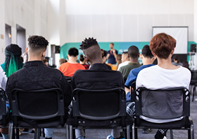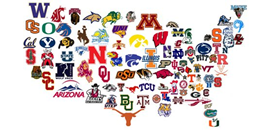The Coronavirus and College Admissions: Part 1
 It isn’t all bad news: We’ll get through this current crisis, and the sun will still come up tomorrow – and the next day, and the next – but it’s very serious news right now, and the landscapes illuminated by those sunrises are certain to be different from those we’ve known. What follows are some ways in which colleges, students, and their parents will be affected by past, present, and likely future.
It isn’t all bad news: We’ll get through this current crisis, and the sun will still come up tomorrow – and the next day, and the next – but it’s very serious news right now, and the landscapes illuminated by those sunrises are certain to be different from those we’ve known. What follows are some ways in which colleges, students, and their parents will be affected by past, present, and likely future.
A recent post from apnews.com titled “Financial hits pile up for colleges as some fight to survive” puts the problems faced by colleges in rather stark terms:
Colleges across the nation are scrambling to close deep budget holes and some have been pushed to the brink of collapse after the Coronavirus outbreak triggered financial losses that could total more than $100 million at some institutions.
 Scores of colleges say they’re taking heavy hits as they refund money to students for housing, dining, and parking after campuses closed last month. Many schools are losing millions more in ticket sales after athletic seasons were cut short, and some say huge shares of their reserves have been wiped out amid wild swings in the stock market.
Scores of colleges say they’re taking heavy hits as they refund money to students for housing, dining, and parking after campuses closed last month. Many schools are losing millions more in ticket sales after athletic seasons were cut short, and some say huge shares of their reserves have been wiped out amid wild swings in the stock market.
Yet college leaders say that’s only the start of their troubles: Even if campuses reopen this fall, many worry large numbers of students won’t return. There’s widespread fear that an economic downturn will leave many Americans unable to afford tuition, and universities are forecasting steep drop-offs among international students who may think twice about studying abroad so soon after a pandemic.
“If you play out the scenarios that are out there, it really makes you nervous,” said Mary Papazian, president of San Jose State University… It’s a dire situation if the worst comes to pass.”
The apnews.com post goes on to point out that
 Dozens of colleges have instituted hiring freezes, and many are halting construction projects so they have enough money to pay employees. But university presidents say the savings will only stretch so far, and many are asking the federal government for a second stimulus package to avoid deeper cuts.
Dozens of colleges have instituted hiring freezes, and many are halting construction projects so they have enough money to pay employees. But university presidents say the savings will only stretch so far, and many are asking the federal government for a second stimulus package to avoid deeper cuts.
The $2 trillion rescue bill signed by President Donald Trump last month provides $14 billion for higher education. The American Council on Education, an association of college presidents, had requested $50 billion and called the package “woefully inadequate.”
“This crisis is causing massive disruption to students, institutional operations and institutional finances. On some campuses, it is creating an existential threat, potentially resulting in closures,” Ted Mitchell, the group’s president, wrote in a letter to Education Secretary Betsy DeVos.
Even colleges with deep reserves are expecting a painful financial blow from the pandemic. Brown University was among the first to announce a hiring freeze, citing “dramatic reductions in revenue.” Yale University followed on March 31, asking departments to update budgets in preparation of a “significant loss” in revenue.
The University of California, Berkeley, and the University of Wisconsin, Madison, each expect losses of about $100 million, and that’s assuming campuses reopen by this fall.
It leaves some colleges wondering if they can meet demand for financial aid, which is expected to surge as millions of Americans lose their jobs [italics added]. Many schools draw from their endowments to pay for scholarships, faculty jobs and campus operations, but those reserves have taken deep losses as markets tumble.
And as to students, a recent chronicle.com post titled “How Is Covid-19 Changing Prospective Students’ Plans? Here’s an Early Look” reads, in part,
In this spring of jaw-clenching uncertainty, everyone expects Covid-19 to derail the plans of prospective college students. One big question is: How many?
Hordes of them, the results of a new survey suggest. One in six high-school seniors who expected to attend a four-year college full time before the outbreak of the novel Coronavirus now think that they will choose a different path this fall. Three out of five students, though still intending to enroll in a bachelor’s-degree program, are concerned about their ability to attend their first-choice college.
 The apnews.com post echoes some of those concerns:
The apnews.com post echoes some of those concerns:
Perhaps the greatest question for colleges is fall enrollment. Recent surveys have found that large shares of high school seniors plan to take a gap year before starting college. At the same time, colleges have been forced to cancel campus visits and other events designed to court students.
It’s a major concern for colleges that have come to rely on international students [Note: Those students help fill colleges’ coffers because they typically pay “full price”], especially those from China. At the University of Connecticut, which hosted nearly 3,000 students from China last fall, officials are bracing for international enrollment to drop by 25% to 75%, a loss of up to $70 million next year.
On the matter of financial aid, a recent usnews.com post titled “How the Coronavirus Can Disrupt Your College Financial Aid” notes that
Colleges now have more flexibility in federal financial aid matters as they respond to the Coronavirus pandemic.
In normal times, colleges and universities in the U.S. couldn't simply flip a switch to become virtual learning institutions and continue to provide students federal financial aid without proper approval. But these are not normal times, as more than 100 institutions – and counting – have canceled in-person classes in an attempt to slow the spread of the new Coronavirus COVID-19 disease.
 The U.S. Department of Education announced March 5 that it would make significant adjustments in response to the Coronavirus outbreak, which was declared a global pandemic by the World Health Organization last Wednesday.
The U.S. Department of Education announced March 5 that it would make significant adjustments in response to the Coronavirus outbreak, which was declared a global pandemic by the World Health Organization last Wednesday.
"One flexibility a lot of institutions are using is the ability to switch from in-person classes to distance ed and not have to go through all of those approval processes. They can just make that change right now in the middle of the term," says Karen McCarthy, director of policy analysis at the National Association of Student Financial Aid Administrators.
"If an institution chooses that option, those students are fully eligible for the financial aid they have received and there will not be those financial aid disruptions there would be if the institution completely closed," she says.
Despite this guidance, the chaos that has ensued following the unprecedented campus closures and class cancellations has hit financial aid departments as they attempt to address student questions and concerns. More answers and flexibility in federal financial aid may come in emergency legislation, McCarthy says.
"There are unaddressed issues that the Department of Education doesn't have the authority to be flexible on; those are issues for Congress."
Current students who continue their courses online due to canceled in-person classes will maintain their eligibility for federal financial aid.
However, not all courses can be easily translated – if at all – to online courses, such as labs and clinical practicums. Such classes may be canceled, and if a student drops down to part-time enrollment status, he or she may lose federal financial aid eligibility.
 The usnews.com post reported that
The usnews.com post reported that
Some Students May Receive More Financial Aid
In cases where a parent loses his or her employment as a result of the Coronavirus outbreak, financial aid administrators may be able to adjust and thereby increase a student's aid.
"The use of professional judgment where students and/or their families have been affected by COVID-19 is permitted, such as in the case where an employer closes for a period of time as a result of COVID-19," guidance from the Education Department reads.
And that the
Department of Education Ensures Work-Study Payments
Affected students who rely on federal work-study can anticipate receiving that aid even as they may be learning off campus through virtual classrooms or their campuses are closed.
"If the college closes such that the student can no longer work their federal work-study job or their off-campus employer closes and they're not able to work those hours, the Department of Education says so long as the student started work, they can pay the student," Kantrowitz says.
"But this guidance didn't say how the colleges will pay students," he adds, and payment may vary depending on a student's typical work schedule and other factors.
According to the usnews.com post, another facet of the financial aid matter is that
The Coronavirus Also Affects Student Loan Borrowers
In the immediate future, borrowers will see a pause on interest for some student loans. President Donald Trump announced late last week, "To help our students and their families, I've waived interest on all student loans held by federal government agencies, and that will be until further notice."
The economic impact of the new Coronavirus may continue to touch student loans in the coming year as well. Interest rates for student loans to be awarded in the 2020-2021 academic year will be set in coming months. As the stock market continued to plunge last week, some experts suggest it's likely that interest rates on student loans will be slashed as well.
Travis Hornsby, founder of Student Loan Planner, a website that offers advice from certified financial professionals, predicts that interest rates on new direct loans will settle around 2% or 3% for undergraduate students, down from 4.53%, and 4% for graduate students, down from 6.08%.
For borrowers already holding student loans, these low interest rates could present an opportunity to refinance.
"Current borrowers that are trying to pay back their loans need to consider refinancing," Hornsby says. But the opportunity may be short-lived, so he advises, "If you can get a good rate, do it now."
In Part 2 of our blog feature, we’ll investigate more closely how the pandemic has altered the specific topography of the admissions process.
